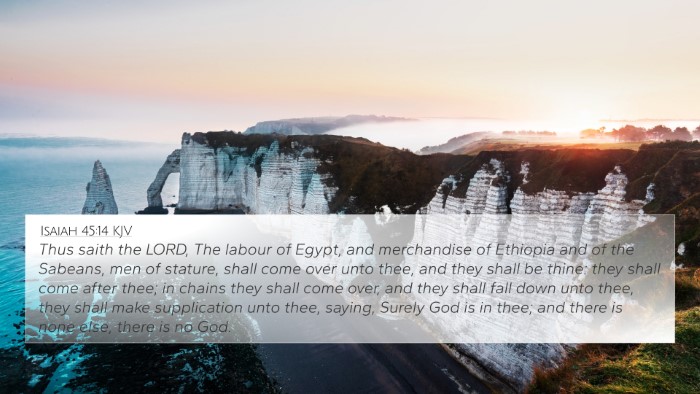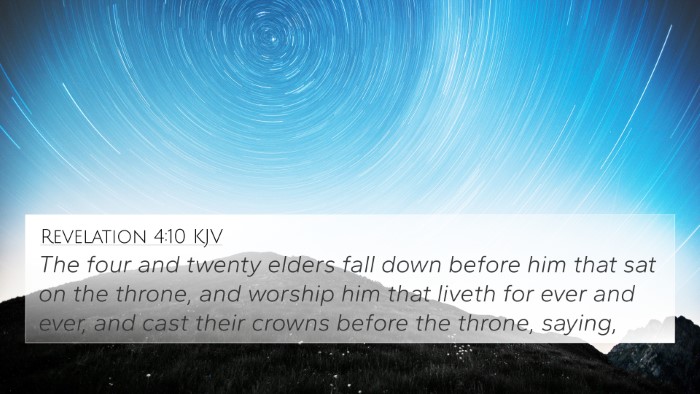Understanding Luke 4:7
Luke 4:7 (KJV): "If thou therefore wilt worship me, all shall be thine."
This verse comes from a pivotal moment in the temptations of Jesus Christ, where the devil offers Him all the kingdoms of the world in exchange for worship. The enormity of this temptation reveals several key themes and connections within the Bible.
Commentary Insights
- Matthew Henry:
Henry points out that this temptation showcases the devil's cunning nature and his understanding of human weaknesses. He emphasizes that worshipping anything other than God leads to spiritual downfall. The essence of this temptation lies in misplaced priorities.
- Albert Barnes:
Barnes interprets this verse within the broader context of Jesus' mission on Earth. He suggests that the offer was an insidious attempt to divert Jesus from His path, hinting that earthly power cannot be divorced from spiritual loyalty and integrity.
- Adam Clarke:
Clarke discusses the implications of worship, noting that it signifies ultimate submission and allegiance. The verse is a reminder that true worship is owed only to God and that the temptation of wealth and power is prevalent throughout scripture.
Key Themes and Interpretations
The underlying theme of Luke 4:7 aligns with the broader message of resisting temptation and understanding the true nature of worship.
- Temptation: This encounter highlights the struggle against evil and the need to choose righteousness.
- Worship: The foundation of this verse illustrates that worship can only belong to God, for He alone is worthy.
- Earthly Power vs. Divine Authority: The offer made to Jesus juxtaposes transient earthly power against His divine mission, marking a significant contrast between spiritual and material realms.
Cross-References
To deepen the understanding of Luke 4:7, several key cross-references shed light on its themes:
- Matthew 4:9: A parallel account of the temptation of Jesus where the devil offers the kingdom.
- Revelation 13:4: The worship of the beast, highlighting the dangers of idolatry and allegiance to false powers.
- Exodus 20:3: "Thou shalt have no other gods before me" - God’s commandment about worship.
- Luke 16:13: "No servant can serve two masters" - The impossibility of divided loyalty.
- 1 John 2:15: "Love not the world, neither the things that are in the world" - A warning against worldliness.
- Romans 12:2: Transforming and renewing one’s mind to discern God’s will, as opposed to worldly pleasures.
- Psalm 115:4-8: The futility of idolatry, contrasting true worship with the worship of idols.
- Philippians 3:19: Warns about those whose god is their belly - a metaphor for earthly desires.
- Matthew 28:18: Jesus declared that all authority has been given to Him, affirming His ultimate sovereignty.
- Matthew 6:24: Similar message stressing the commitment to serve God above material wealth.
Connections between Bible Verses
The verse in question not only stands alone but integrates with numerous biblical texts, showcasing thematic connections throughout scripture:
- Link to Old Testament: Jesus' rejection of the devil's offer reflects the steadfastness seen in figures like Daniel (Daniel 6) and Joseph (Genesis 39), who also resisted temptation.
- New Testament Parallels: The temptation emphasizes the heart of Christ's mission, which could be cross-referenced with Jesus’ teaching on the Beatitudes (Matthew 5), affirming spiritual over material riches.
- Inter-Biblical Dialogue: Connections can also be made with the prophetic texts that address the reign of God, contrasting earthly kingdoms with heavenly authority (Isaiah 9:6-7).
Comprehensive Bible Cross-Reference Resources
For deeper exploration of cross-referencing biblical texts, the following resources are particularly useful:
- Bible concordance for locating themes and verses.
- Bible cross-reference guide for comparative studies.
- Cross-reference Bible study tools to enhance understanding.
- Comprehensive Bible cross-reference materials for theologians and laypersons alike.
Conclusion
Luke 4:7 is rich with meaning and invites believers to engage in a careful study of worship, authority, and the nature of temptation. Through insightful commentary and careful cross-referencing, one can appreciate the intricate connections that echo throughout the biblical narrative, aiding in a deeper understanding of scripture.











